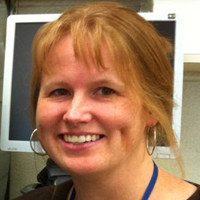
Krista A. Frankenberry, Ph.D.
- Center for Cancer Research
- National Cancer Institute
- Building 535, Room 334
- Frederick, MD 21702-1201
- 301-846-1916
- frankenk@mail.nih.gov
RESEARCH SUMMARY
Dr. Krista Frankenberry has worked extensively on analyzing drug resistance in HIV patients. She and her colleagues have identified mutations outside of the expected drug target regions of HIV (connection domain in reverse transcriptase) that have led to the discovery of novel mechanisms of NRTI and NNRTI drug resistance. In addition, Dr. Frankenberry and colleagues confirmed that the newly discovered virus, XMRV, was not linked to chronic fatigue syndrome or prostate cancer, but instead was the result of contamination. Her work now focuses on developing novel strategies against HIV-1 using gene therapy.
Areas of Expertise

Krista A. Frankenberry, Ph.D.
Research
Our research in the Viral Mutation Section of the HIV Drug Resistance Program focuses mainly on the biology of the HIV-1 virus, specifically trying to better understand how HIV-1 develops drug resistance. By examining the HIV-1 virus isolated from patients post-drug therapy, we can determine which mutations the virus has undergone to escape drug treatment. We can then (1) test further how these mutations affect the replication of the virus, (2) determine whether these mutations are also resistant against other FDA-approved HIV-1 antiviral drugs, and (3) elucidate the biochemical mechanism of how these mutations counteract antiviral drugs.
The first drug approved for treatment of HIV-1-infected patients was AZT, a drug targeted to the HIV-1 reverse transcriptase (RT), which is an essential enzyme in the viral life cycle. Currently, all FDA-approved drugs against RT target the polymerase active site or a drug-binding site near the active site in the polymerase domain. Identification of mutations located in this region has been used in guiding patient drug regimens. Our research has shown that mutations that lie outside of the polymerase domain, within the C-terminal domain of RT (amino acids 312-560), can significantly increase resistance to nucleoside as well as non-nucleoside RT inhibitors in several HIV-1 subtypes.
Our efforts have shown that these mutations affect a second active site in the RT enzyme (RNase H active site), and this has led to the discovery of a novel mechanism of HIV-1 drug resistance: mutations that disrupt the unique balance between the two enzymatic properties of RT, the RNase H cleavage activity or the RNA- and DNA-dependent DNA polymerase activity, can lead to RT inhibitor resistance in the HIV-1- infected patient. Understanding how RT develops resistance to antiviral drugs can provide greater insights into new anti-HIV-1 drug development.
Publications
A novel molecular mechanism of dual resistance to nucleoside and nonnucleoside reverse transcriptase inhibitors
HIV-1 reverse transcriptase connection subdomain mutations reduce template RNA degradation and enhance AZT excision
Psi- vectors: murine leukemia virus-based self-inactivating and self-activating retroviral vectors
Generation of multiple replication-competent retroviruses through recombination between PreXMRV-1 and PreXMRV-2
Recombinant origin of the retrovirus XMRV
Biography

Krista A. Frankenberry, Ph.D.
Dr. Krista Delviks-Frankenberry completed her B.A. in Biochemistry at Hood College in Frederick, Maryland and earned her Ph.D. in Genetics and Developmental Biology from West Virginia University. Her Ph.D. work examined the development of safer viral vectors for gene therapy. Dr. Delviks-Frankenberry completed her postdoctoral training with Dr. Vinay Pathak in the Viral Mutation Section, HIV Drug Resistance Program, NCI, where she now holds a Staff Scientist position. She also spent two years teaching as an Assistant Professor in the Department of Biological Sciences at Marshall University in West Virginia. Dr. Delviks-Frankenberry currently serves as the secretary for the Staff Scientist/Staff Clinician Organization on the Frederick campus.
